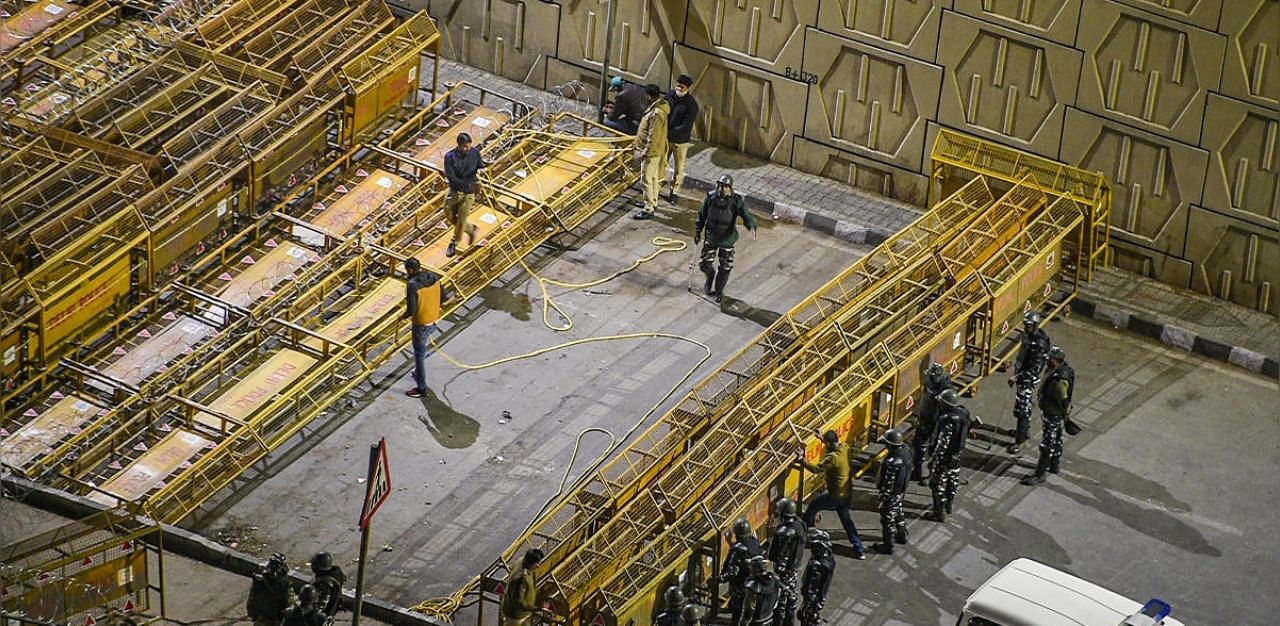
Ahead of a planned 'chakka jam' by agitating farmers in several parts of the country, the Centre has directed the Delhi Police to ensure foolproof security at all key installations in the national capital to prevent any 'January 26 Red Fort-like incident', official sources said.
The Delhi Police has been instructed to use minimum force, but also told that those endangering the safety of the security personnel should be dealt with sternly, sources said.
These instructions were given at a high-level meeting chaired by Union Home Minister Amit Shah and attended by NSA Ajit Doval, city Commissioner of Police S N Shrivastava among others on Thursday, official sources said on Friday.
The Delhi Police has been directed to ensure foolproof security at places of national significance like the Parliament, the India Gate, sources said.
Read: Farmers call for nationwide 'chakka jam' on Saturday except in Delhi, UP and Uttarakhand
During the meeting, held to discuss the security arrangements being made ahead of Saturday's 'chakka jam' by farmer unions, it was emphasised that there should not be a repeat of the Republic Day violence.
Large scale violence was reported during a tractor rally on January 26 in the national capital. A group of protesters also stormed the historic Red Fort, indulged in vandalism and hoisted a Sikh religious flag there. Hundreds of people, including security personnel, were injured and one protestor died after his speeding tractor overturned.
The Union Home Minister was informed by the Delhi Police that it was coordinating with the Uttar Pradesh and and Haryana police to ensure that there were no incidents of violence during the 'chakka Jam' and there is minimum inconvenience to general public.
The SKM (Samyukt Kisan Morcha) had earlier this week announced the nationwide chakka jam on Saturday for three hours from 12 pm to 3 pm, saying that farmers would block national and state highways for three hours in protest against the Internet ban in areas near their agitation sites, harassment allegedly meted out to them by authorities, and other issues.
However, according to Bharatiya Kisan Union (BKU) leaders, Delhi, Uttar Pradesh and Uttarakhand will be exempted from the jam.
Meanwhile, the government has also decided that additional paramilitary personnel will be Integrated into the security grid wherever needed in view of the 'chakka jam', sources said.
Thursday's meeting also discussed the Delhi government's decision to withdraw a substantial number of buses provided by the Delhi Transport Corporation for security duties.
The Delhi Police will make alternative arrangements for transportation of its personnel for which drivers of the forces with heavy vehicle licence are being identified, sources said.
The Delhi Police has tightened security at three Delhi border points -- Singhu, Tikri and Ghazipur --where farmers have been protesting for over 70 days, demanding a complete repeal of three farm laws --Farmers' Produce Trade and Commerce (Promotion and Facilitation) Act, 2020; Farmers' (Empowerment and Protection) Agreement on Price Assurance and Farm Services Act, 2020; and the Essential Commodities (Amendment) Act, 2020.
These laws were enacted in September last.
The protesting farmers have expressed apprehension that these laws would pave the way for the dismantling of the minimum support price (MSP) system, leaving them at the "mercy" of big corporations.
However, the central government has maintained that the new laws will bring better opportunities to farmers and introduce new technologies in agriculture.